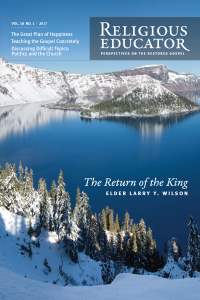Discussing Difficult Topics: Politics and the Church
Richard Davis and Thomas A. Wayment
Richard Davis and Thomas A. Wayment, "Discussing Difficult Topics: Politics and the Church," Religious Educator 18, no. 1 (2017): 112–23.
Richard Davis (richard_davis@byu.edu) was a political science professor at Brigham Young University when this article was publsihed.
Thomas A. Wayment (thomas_wayment@byu.edu) was publications director of the Religious Studies Center when this article was published.
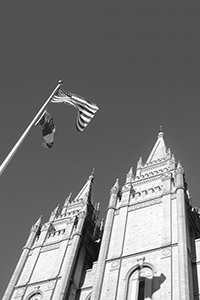 We need to recognize that there is political diversity in the Church, and we need to be accepting of other people who think differently.
We need to recognize that there is political diversity in the Church, and we need to be accepting of other people who think differently.
Wayment: I’ll just start out by saying that we’re here with Richard Davis, professor of political science and director of the Office of Civic Engagement. Richard is also the author of The Liberal Soul: Applying the Gospel of Jesus Christ in Politics, published by Greg Kofford Books in 2014, and he is the author of Fathers and Sons: Lessons from the Scriptures. Richard is also a weekly columnist for the Deseret News and was chair for the Utah County Democratic Party from 2007 to 2011.
Wayment: So, Richard, my first comment is—and I want to word this respectfully—that we’re hearing in religion and from a lot of places that there’s a growing divergence between what Latter-day Saint youth, or the millennial generation, think politically and what our religious leaders think politically. This gap is starting to open up. I’m wondering if you can describe that in your own terms, whether you agree that it is happening or whether it is maybe more nuanced than that?
Davis: Well, I get that impression as well, although I haven’t seen any survey data that actually shows that. But when I look at the students—I don’t ask them what their views are on social issues, but it sort of comes out—I do think that what you’re describing is true. I’m not sure that it’s new, however. So if you were to go back to the 1960s and 1970s and you were to ask many LDS youth about the ban on blacks holding the priesthood and whether they agreed with that, I’m not sure what kind of response you might get. I think there have always been members that have felt like there is some part of Church policy that they don’t agree with. Now, they might not have been as vocal as young people are today because we have so many social media venues for them to be vocal, but I know there are a lot of members who oppose the Utah Compact, which was an agreement among Utah community leaders on immigration that the Church was supportive of. Also, the Church has made a statement about guns in churches and that the Church doesn’t want guns in church buildings, and I think there are many people, Church members, who would say, “I’m going to take my gun wherever I want to because it’s my gun and I have the right to do so.” I think there are also women’s rights issues. I think in the past, there were a lot of people who did not go along with the Church’s position on the Equal Rights Amendment, but I think the difference is that among this generation, because it has social media and so many networking capabilities, those who differ become more visible in their opposition.
So I guess what I’m trying to do is sort of dampen the sense that it’s all new and to put it in perspective so that somebody who’s dealing with LDS youth doesn’t think this is an indication of how far off this particular generation is compared with other generations. I think it is more nuanced than that. I think the difference may be the visibility of the opposition: you can see it on Facebook, you can read it on Twitter, and you can see it on blogs, whereas that didn’t happen thirty, forty, or fifty years ago.
Wayment: That is a great point. I want to make sure I am understanding you right. So rather than seeing it as a generational divide or differences over a single issue or two, what you’re saying is it’s really happened for a long time. So effectively, teachers who see this great divide between their students and themselves might also personally diverge from the Church on other issues. Is that right?
Davis: Yes, I think that is quite possible.
Wayment: So, for example, the teacher may struggle with Second Amendment statements but then places more emphasis on this generational division.
Davis: Exactly. So I think what we are doing is essentially saying that the disagreement that happens here in this particular issue—if we are talking about gay marriage—is somehow far more important than other things in other areas in the past, and I don’t think so. I think there have always been members who have had difficulty with something, and the Church has survived, and therefore we probably need to be tolerant, as tolerant today as would have been the case thirty, forty, or fifty years ago with the differences that existed among members. I think most people have something that they have a problem with, and therefore, to say, “My problem is tiny or not as significant, but your problem, however, is huge” is damaging because all that does is to separate people from the Church.
Wayment: That is a great point, Richard. Would you criticize my approach here? I say to students to be patient. Is it a bad idea to say I might feel differently about this political position, but I will just try to remain patient during the time that I don’t understand it? Should I be more activist?
Davis: Patience may assume an air of condescension or paternalism, like, “You’re not there; I’m there, and you will be there someday, and I just need to be patient with you.” I’m not sure that’s necessarily the case. We don’t know what will be in the Lord’s mind in the future; we don’t know what is going to happen. I remember being told as a youth in the 1960s and the early ’70s that blacks would receive the priesthood after the Millennium occurred. So for someone who felt like that was not something they felt good about—a priesthood ban based on their color or their race—what that person was being told was, “Well, you’re going to have to live with it because in your lifetime it is never going to change; it is going to change after the Millennium, many, many years from now.” Clearly, that is not what happened. So I am not predicting that there is going to be a specific change, but I am also not likely to say it is not going to happen, that change is not possible in the future, and therefore I think we need to be accepting of the fact that we shouldn’t say what the Lord is going to do tomorrow, twenty years from now, fifty years from now, or one hundred years from now. I wouldn’t want to presume that.
Wayment: That is a great point. I want to direct you to something that you started this conversation with. We as a Church are neutral politically, but LDS classrooms are rarely neutral; LDS sacrament meetings are rarely neutral. So can you speak to this idea that there is kind of an accepted politics among Latter-day Saints, but we teach neutrality? Help me navigate that as someone who might see the world a little different politically.
Davis: So the institution is politically neutral, but the members are not; they don’t have to be. So what happens when you put the members into the institutional sphere? Are they still supposed to be neutral? For example, in my home, in a community setting, I can be as biased as I want to be, as politically directed in one way or another as I want to be. But once I enter the church building and I am in a classroom, particularly if I am the one who is the teacher or the leader, or if I am in a ward council or a bishopric meeting or some other meeting like that, do I need to maintain a neutrality that goes with the institution, or can I maintain my role as a non-neutral member? I think that is where these spheres sort of butt up against each other. The problem has been trying to get members to see the institutional sphere as one where they should leave their prejudices at the door and recognize that we are there to worship; we are not there for political purposes. They are dealing with members who think differently than they do. They are also perhaps in the midst of investigators who are wondering, what is this church about? What are these members like? Even though we talk about the Church as an institution, for almost everybody else outside the church, the Church is its members, and they judge the Church by the members. So in an institutional setting, we should try to encourage members to say, “No, this is not really the place for me to criticize some national leader I don’t like or some politician I don’t like.” I have seen this, and you’ve seen this before. We need to go beyond that and recognize that there is more political diversity in the Church than we realize exists, and therefore we need to be accepting of other people who think differently and not suggest that they have some kind of a spiritual defect because they are different. They think differently. So in our recent election, is someone who liked Donald Trump spiritually bankrupt? From one perspective, we wonder how he or she could possibly support him, but on the other hand you get the person who voted for Hillary Clinton being told, “How could you possibly support a Democrat?” So what I think we need to do is to encourage members to be accepting of the fact that there are differences and that it is not our place to judge the moral character of other members based on what his or her political preferences are.
Wayment: As a teacher, I see this happening at times, where students come away offended because of the politics presented during a message that was taught about, for example, Jesus Christ or a Book of Mormon message, and it creates an interesting dynamic where sometimes we may say things that appear to represent, if you will, the Church’s position, and the students now are debating if they need to accept that part of the message or not. I will be honest; I think it puts the students in a difficult circumstance. Can I disagree with my teacher’s politics but believe in the same gospel that he or she does?
Davis: Well, you can go further and higher than that. When President Ezra Taft Benson was a member of the Twelve, he was very vocal politically, saying that some third party that he was kind of associated with was the party closest to the gospel and closest to the Church. He was just very, very vocal, even during general conference sometimes. So as a member who didn’t agree with him politically, what could you say? There were members I know who left the Church during that time period because they disagreed with his political views. There is certainly a reason for not using the pulpit in that way, because you may actually cause people to go away. You don’t set up those students’ paradox if you’re never using the classroom or the pulpit for your personal political views. But if indeed, thinking about the student’s perspective, that happens, it is hard to send that message: that the authority figure here in my life, the seminary teacher or my Sunday School teacher or my Young Women teacher, is wrong. Students need to realize teachers may say inappropriate things. That is a complexity they are going to have to learn eventually, but it may be hard. We know it is sometimes hard for students because they have an ideal view, and when that doesn’t happen, they may react in different ways.
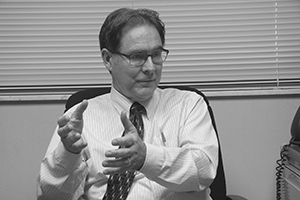 We need to encourage members to be accepting of the fact that there are differences and that it is not our place to judge the moral character of other members based on what his or her political preferences are.
We need to encourage members to be accepting of the fact that there are differences and that it is not our place to judge the moral character of other members based on what his or her political preferences are.
Wayment: Yes, it is tough for a student to make sense of that. I want you to help us understand this idea of religious liberty that is such a hot topic right now, and if I mischaracterize it, correct me. We are hearing a lot about individual rights. Could you not necessarily take a personal position but tell us what is at stake? What are the two camps fighting for?
Davis: Well, they are both fighting for the same thing; they are fighting for recognition of their separate identities. So religious freedom advocates are saying, “We should be able to practice our religion, which may bump up against society’s views about things,” and the proponents of individual rights, particularly the LGBT community right now, are saying, “If we allow that, then we are basically allowing discrimination to exist.” So I know if I go in to get my clothes dry-cleaned, and the person says, “I am not going to serve you because you are gay, and I have a religious conviction that I do not serve gay people,” what exactly is the resolution to that? The way that our society has worked in the United States is that once we have established a right, we make it uniform. So if you have a right and you go to someone who is providing a public service, you maintain that right; they cannot discriminate against you on the basis of that right.
Wayment: So do you see one side winning this argument right now? Is there a momentum or tide change here in the fight for religious liberty versus individual rights? I hear both sides crying foul a little bit.
Davis: Yeah, there’s already a winner, and that is the side that favors individual rights, because the religious liberty advocates are trying to carve out some kind of religious exemption in what society has determined as a right that exists. If you flip the situation here, and the argument had to do with, let’s say Latter-day Saints, I don’t think we would want to go into some place that provides a public service for people generally and be told that because we are Mormons, we’re not going to be served, that we’re not going to get a meal at a restaurant or get a hotel room. We would be outraged by that kind of behavior, and that is exactly what has gone on with the LBGT community, and it went on before with race. In the early 1970s, I lived in Georgia. We were traveling, and we went to a hotel in southern Georgia. I was walking in with my father, and he asked whether there was a room available. The owner said there were plenty of rooms. As my father was checking in, an African American couple came in and asked if there were any rooms available. They were told, “No, this gentleman here has taken our last room. Sorry.” Of course we knew he was lying. My father told the owner, “If you won’t serve these people, we don’t want to stay here,” and we walked out. He lost two customers because of his views, but that’s the way it was for blacks in the South. Do we really want to be that way as religious believers, as Latter-day Saints? I don’t think we do. If an LBGT couple were to go to somebody who does weddings and be told, “No, we’re not going to get you a wedding dress or a wedding suit because of who you are,” then that’s the same kind of thing. Society as a whole has said, “No, we don’t tolerate that; that’s not acceptable.” So I think we’ve already got a victor here—the individual rights group—and I think we all probably would prefer that to be the case. Now, that doesn’t mean that we can’t go into church and say what we want to say. We also should be able to go into the public sphere and say what we want. That same wedding store owner can write a letter to the editor, can try to change the law, or can do all of those sorts of things to reflect his or her religious views in the public square. But in terms of a public service, if service providers are going to provide it for some people, they have to provide it extensively for everybody, for the public.
Wayment: Let me have you speak a little bit now to an increasingly common attitude. I’ve heard some say, “I’ll follow my Church leaders in going down this religious liberties path, but privately I don’t feel that way; privately I don’t want to exclude gay marriage. I don’t want to do those things.” I’m hearing that a lot, that there is one identity I have on Sunday and one identity that I have personally. Maybe I hear this so often because of my affiliation with Religious Education, but colleagues are saying that’s a really dangerous attitude and that we need to get the youth in line. I’m searching for a narrative to help us understand that.
Davis: I can see where it’s dangerous. There is a lack of integrity when you’re saying one thing here and you’re saying a different thing there and you’re following what the Church says on Sunday and then the rest of the week you’re doing whatever you want. We certainly want people to have integrity. We don’t want them to feel like they have to pretend to be one thing; that is a real problem. It’s better if they just say in all settings how they feel, and if they don’t feel like they support that particular aspect, they aren’t judged as not having a testimony. It’s like someone who says they don’t like this part of the Word of Wisdom or that they like to watch football on Sunday or something like that. But again we seem to focus on this one as being far more important than any of the others, which has the effect of basically telling people they don’t belong because their difference is much larger than others’ differences. Therefore, they don’t really belong in this society unless they shift their ideas. But then they are being asked to pretend. And to me, it’s dangerous to engage in that sort of pretending. It’s probably better to say what your problems are, what your issues are, and what is bothering you, and get that out in the open. I’ve heard so many times from various teachers that there are some issues that they take out, look at, can’t resolve, and put back on the shelf, and they wait until another day to answer them. They just go on with their lives. My guess is that for many of us, there is something on the shelf that we don’t understand and that we may not like, but we just take it down and examine it and, if we can’t resolve it, wait for some future resolution of the issue. But I think that’s different than pretending that it doesn’t exist.
Wayment: I’m going to push you just a little harder on this. Your daughter comes home and says, “Dad, I really liked what I heard in Sunday School today, but there was this real pressure to think one way about a political topic, a political position, and I felt really uncomfortable.” How would you counsel your son or daughter to manage those feelings? What do you say to that child who’s wondering if it is OK to feel a little hurt or a little annoyed about what was said?
Davis: I think the best thing is to set an example, which goes a couple of ways: the example of being faithful but also the example of being honest in saying that I too have some issues. There are also some things that I have difficulty with. It sends the message to others and to family members that if they have difficulty with some issue at some point, it’s OK; they don’t have to leave the Church because they have an issue of disagreement or are uncomfortable with something. People are human, and they may use the setting (the pulpit or the classroom) in a way that’s inappropriate to express their political ideas, and we’re just going to have to deal with that occurring at times. We have the right to say something about it if we disagree in class. The message should be: if you don’t feel comfortable doing that, don’t do it until you do, but don’t feel like this has to be some deal breaker for you in terms of being a disciple of Christ or trying to be a disciple of Christ. These disagreements are typically a small part of the gospel. Even whether one opposes or supports gay marriage is a small part of the total gospel of Christ.
Wayment: This is my last question, and maybe it is a softball question. You have these multiple identities. You’re a believer; you’re a BYU professor; you’ve held political office; you’ve served the community politically; you’ve done a lot of interesting things. I want you to share for a couple of minutes, where do you connect spiritually to the message? I think that will be a meaningful thing. What makes you tick? When I read The Liberal Soul, I felt like I was hearing some of that. So I was wondering if you have a word of advice, a word of wisdom that you might share?
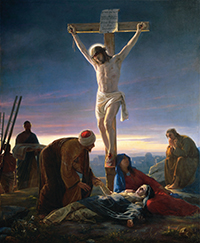 "I try to keep my focus on the core of the gospel, and that is about Christ and his crucifixion; it is about a daily walk, an attempt to deal with my sins through his Atonement."
"I try to keep my focus on the core of the gospel, and that is about Christ and his crucifixion; it is about a daily walk, an attempt to deal with my sins through his Atonement."
Davis: I try to keep my focus on the core of the gospel, and that it is about Christ and his Crucifixion; it is about a daily walk, an attempt to deal with my sins through his Atonement. I try to become more Christlike and not to become immersed in the trivia of the day. I think some of these things are the trivia of the day in the sense that people—and I see this with my students as well—get very concerned about what’s going on right now, and they don’t put it in perspective, a broader eternal perspective that Trump and Clinton are going to go away and that even the issue about gay marriage is going to go away. It’s the hot thing today, but blacks and the priesthood was the hot issue of the day when I went on a mission. I went on a mission to the South before 1978, and that was a big issue. I was in the temple recently, and I saw this interracial couple walk in, and I thought about how that would not have happened forty years ago; there was so much tension at that time. So I can’t predict what’s going to happen forty years from now. I just think a lot of our supposedly big battles that occur at any given time pale in significance to our individual efforts to live the gospel.
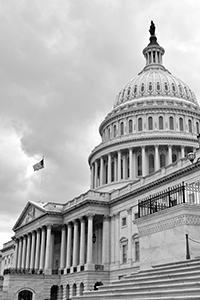 A lot of our supposedly big battles that occur at any given time pale in significance to our individual efforts to live the gospel.
A lot of our supposedly big battles that occur at any given time pale in significance to our individual efforts to live the gospel.
Wayment: That’s a great thought. Is there anything you want to add? Anything you feel needed to be said that would help?
Davis: I think that the main thing I would like to say to seminary teachers or to Sunday School teachers or anyone that deals with the youth is to not be so judgmental and not be so quick to write them out of the Church because of the things that they believe at that particular moment in their lives, which may be different twenty years in the future. Try to avoid using the classroom as a forum for presenting personal political views and for defending those views by reference to some General Authority; President Ezra Taft Benson is clearly one of those where that would be the case. But instead, step back. I remember Elder D. Todd Christofferson saying in general conference—I mention this in the book, so this goes back a few conferences—that the way to judge whether something is doctrine is that it’s being said by lots of people and not just one and that it’s being said over time and not just for a short period of time.[1] We forget that. We may pick out the General Authority that we like at that moment, who’s agreeing with our view, and we say, “There is the gospel right there. That’s Church doctrine,” and not realize that sometimes it may take a while to discern that because you can tell that other General Authorities aren’t saying the same thing at the time. How do you tell whether they are saying it over time unless you have some perspective? You wait a while and ask if this is a continual thing or if it was just something at one point in time. One example is the stance of President Gordon B. Hinckley on the cultural practice of how many earrings to wear. I have not heard anybody else say that.
Wayment: It was very much a statement of what he likes.
Davis: Yes. I heard a little bit of support for that at the time, but I’ve not heard anything since then. So is that Church policy or was that not Church policy? To me, that’s an example of needing to wait and see, and yet I remember so much judgment at the time. In fact, I remember a story about a young man whose girlfriend had two earrings, and she didn’t take out one, and that made him wonder about her. I thought, wait a minute, if President Hinckley’s view on a cultural practice is what is at stake here, not Church policy, why are you judging her based on whether she goes along with one person’s view? That is why it is critical not to judge others quickly, but instead help others, particularly young people, recognize our universal humanness, realize that God does not rob any of us of our agency, and acknowledge that the issues of the day are trivial compared with the broader objective of following the Savior.
Notes
[1] D. Todd Christofferson, “The Doctrine of Christ,” Ensign, May 2012, 86–89; see also http://
